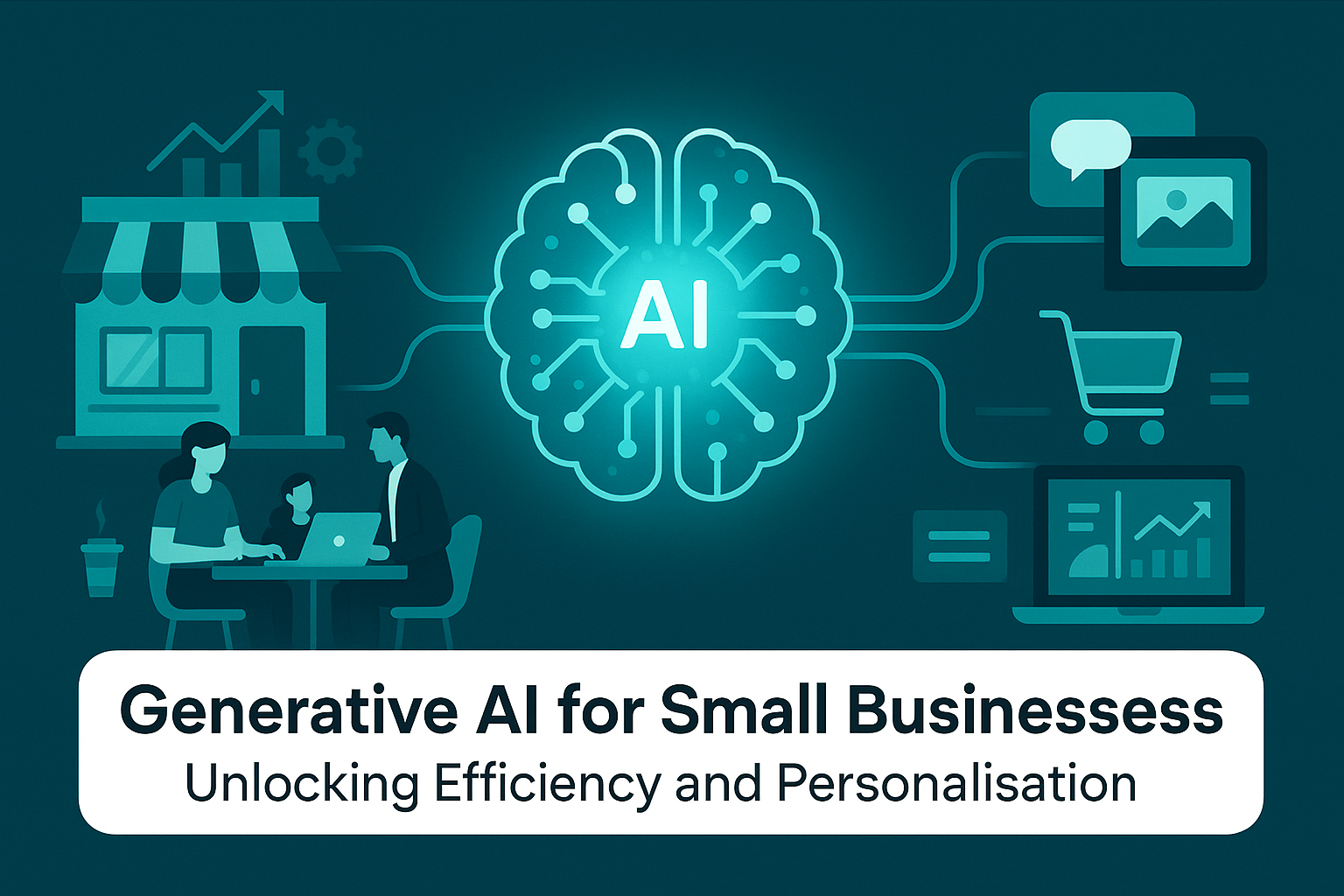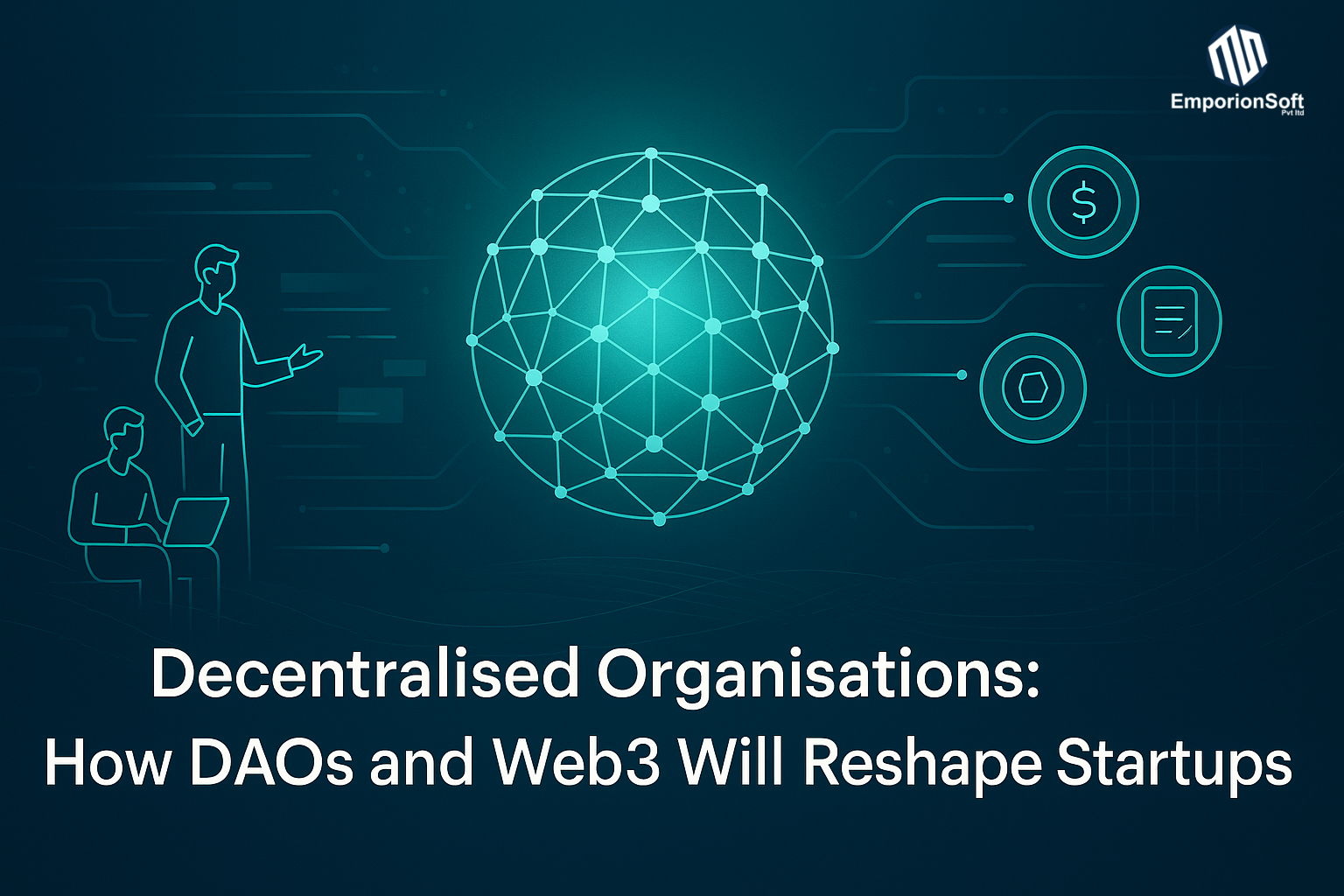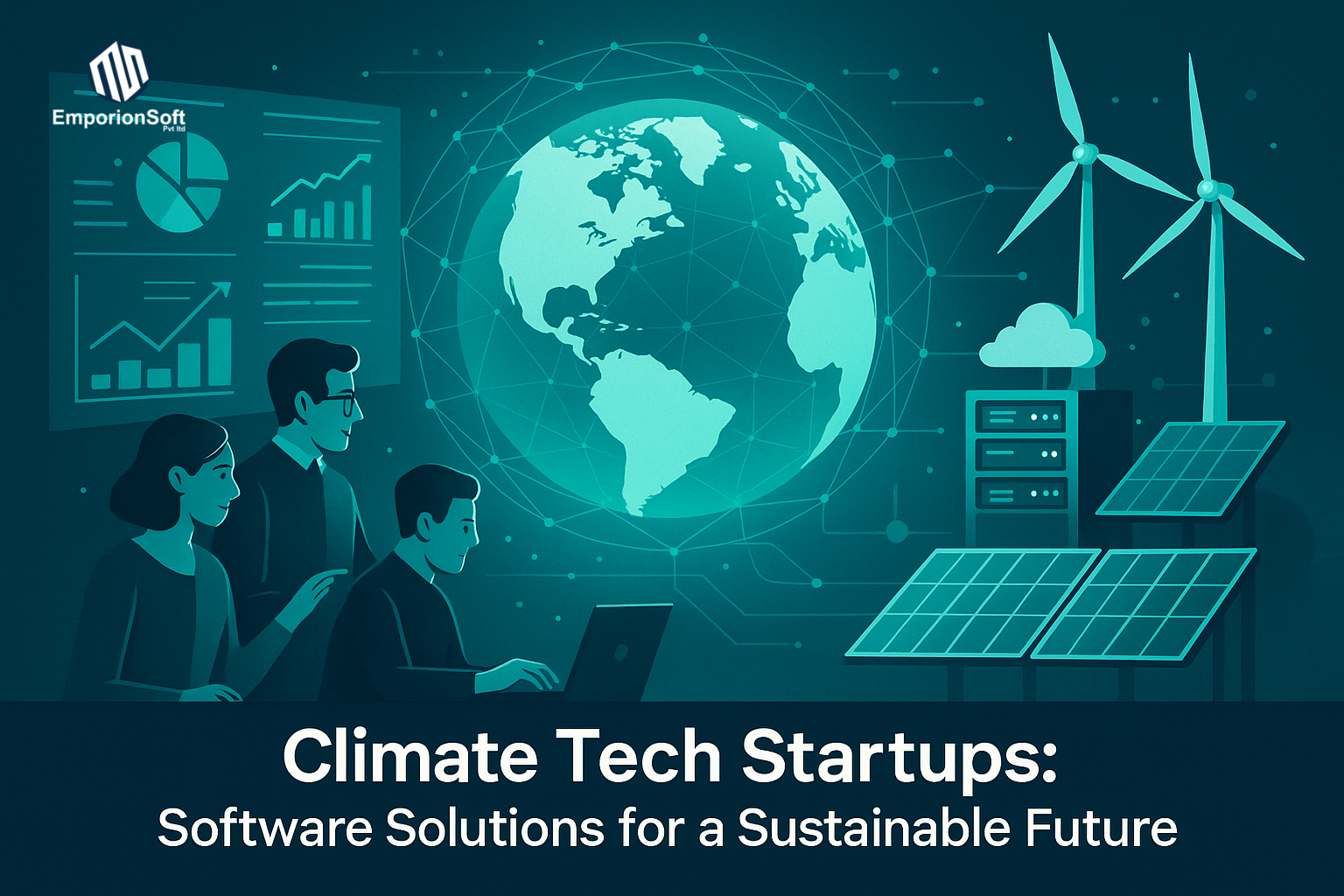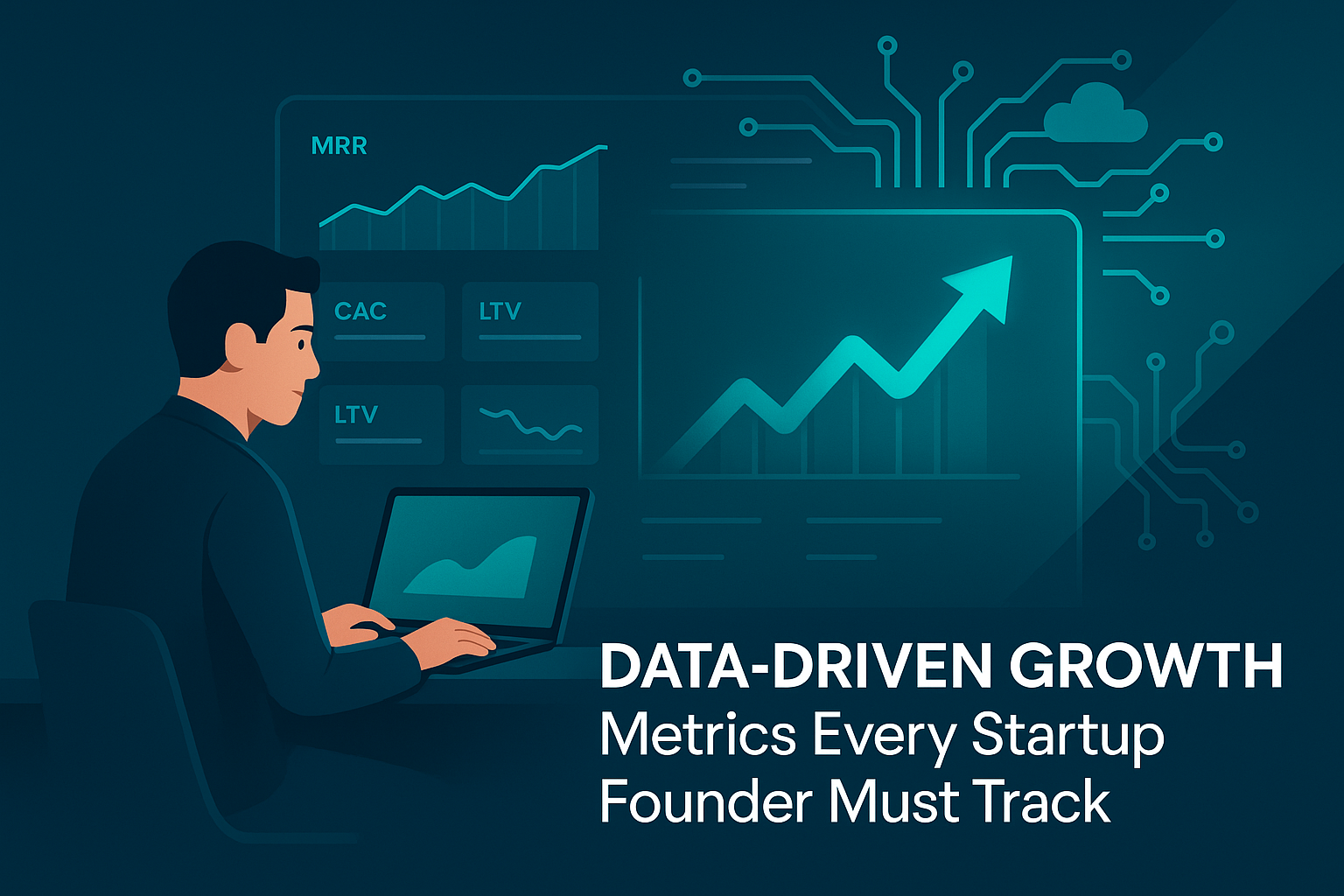Generative AI for Small Businesses: Unlocking Efficiency and Personalisation
Artificial Intelligence is no longer an exclusive tool for Silicon Valley giants. Today, it is reshaping the way even the smallest enterprises operate, compete, and grow. What once required multi-million-pound budgets and vast technical resources is now available to startups, independent retailers, and service providers. Generative AI for small businesses has become a practical reality, opening new possibilities for efficiency, creativity, and customer engagement.
What Does AI Stand for in Business?
Before diving into applications, it helps to clarify the basics. AI, or Artificial Intelligence, in business refers to systems and software that can perform tasks traditionally requiring human intelligence. These include analysing data, predicting outcomes, generating content, and personalising customer interactions.
When we talk specifically about generative AI, we are referring to algorithms capable of producing new, original outputs such as text, images, designs, or even product prototypes. Tools like ChatGPT or GitHub Copilot can draft marketing copy, write emails, generate code, and create design assets. This capability makes ai applications for small business both practical and powerful.
Why Generative AI Matters for SMEs
Small and medium-sized enterprises (SMEs) often face the challenge of limited resources. Competing with larger organisations requires them to do more with less. Generative AI for small businesses offers a unique opportunity to close that gap. By automating time-consuming processes and providing intelligent insights, these tools allow owners and teams to focus on what really drives growth—innovation and customer relationships.
For example, generative AI can streamline email campaigns, personalise website content, or generate instant responses to customer queries. It is also transforming how data is handled. Instead of hiring a team of analysts, businesses can use ai software for small business to quickly identify patterns and predict customer needs.
Everyday AI Applications for Small Business
The practical uses of generative AI extend across industries:
-
Retail and e-commerce: Automating product descriptions, tailoring recommendations, and managing inventory forecasts.
-
Professional services: Drafting contracts, writing proposals, and personalising client communications.
-
Marketing and sales: Generating social media posts, analysing customer feedback, and creating campaign strategies.
These applications show that generative AI is not a distant concept—it is already embedded in the workflows of forward-thinking SMEs.
Levelling the Playing Field
Historically, cutting-edge technology was expensive and difficult to implement. Many business owners still assume that ai software for small business is out of reach. In reality, modern platforms have made these tools affordable, accessible, and scalable. Cloud-based solutions, flexible pricing models, and intuitive interfaces mean that a café in Preston or a consultancy in London can harness the same tools as a multinational corporation.
The key is understanding where generative AI can deliver the greatest return. This might be through reducing repetitive admin tasks, boosting the quality of marketing content, or personalising customer experiences at scale.
From Curiosity to Strategic Advantage
The shift from AI being a “nice-to-have” experiment to a strategic business driver is already underway. Surveys by leading consultancies show that companies adopting AI early are enjoying significant gains in efficiency and customer satisfaction. For small businesses, this adoption is no longer about experimentation—it is about staying competitive.
Whether you are a startup founder or a local entrepreneur, exploring generative AI for small businesses is now less about asking if you should adopt it, and more about when.
Where to Begin
If you are just starting your AI journey, the first step is understanding your specific needs and objectives. Which tasks consume the most time in your business? Where do you struggle to deliver a personalised experience? Once identified, AI tools can be applied in targeted ways that deliver quick wins without overwhelming your operations.
At EmporionSoft, we specialise in helping organisations of all sizes unlock the potential of emerging technologies. From strategy to deployment, our services are designed to ensure that businesses adopt AI in ways that are practical, cost-effective, and growth-oriented
Practical Applications of Generative AI in Small Businesses
Imagine a small design agency preparing dozens of tailored client proposals every month. Traditionally, this task takes hours of research, writing, and formatting. Now, with generative AI for small businesses, a simple prompt can produce a professional draft in minutes—freeing staff to focus on refining ideas rather than building documents from scratch. This is the kind of efficiency revolution transforming everyday business operations.
AI Solutions for Business Across Industries
Generative AI is not confined to one sector. It has evolved into a set of adaptable AI solutions for business that can be customised for diverse needs. For small enterprises, this means gaining access to tools once reserved for multinational corporations. According to Harvard Business Review, companies using AI are already reporting significant productivity gains and improved decision-making (HBR, 2023).
From e-commerce to professional services, the applications are wide-ranging:
-
Retailers can use AI to generate engaging product descriptions or forecast demand more accurately.
-
Hospitality providers can offer personalised travel recommendations by analysing customer preferences.
-
Local consultancies can streamline routine reporting, allowing consultants to dedicate more time to client engagement.
Automating Everyday Business Processes
One of the strongest advantages of generative AI is its ability to streamline business processes that would otherwise consume valuable resources. For example, SMEs can use generative AI to:
-
Draft job descriptions and internal policies.
-
Automatically summarise lengthy reports.
-
Personalise email campaigns at scale.
-
Generate meeting notes or proposals.
By handling these repetitive yet essential activities, AI helps businesses focus on strategy and growth. This positions generative AI not just as a tool for convenience but as a driver of competitive advantage.
Crafting a Professional AI Business Proposal
Creating a compelling proposal can make or break a deal for a startup. Generative AI enables small firms to draft detailed, persuasive proposals in minutes. Instead of struggling with formatting and wording, entrepreneurs can input their key objectives and allow AI to suggest polished copy and structured layouts. This makes AI for business proposal preparation far less daunting, particularly for early-stage companies without large marketing or sales teams.
Enhancing E-commerce with AI Assistants
E-commerce is one of the most dynamic spaces where generative AI has immediate impact. An AI assistant for e-commerce business can provide real-time chat support, recommend products, or even predict what a customer may need based on browsing patterns. These assistants are not only reducing customer service costs but also increasing conversion rates through more personalised experiences.
For instance, small online retailers can integrate AI-powered chatbots to answer FAQs, track deliveries, or suggest complementary items. This leads to smoother customer journeys and stronger brand loyalty. You can learn more about practical implementations in our case studies and explore how AI chatbots in apps are reshaping digital customer engagement.
Real-World Use Cases
-
Marketing agencies use AI to create hundreds of unique social media posts for different clients within hours.
-
Healthcare clinics apply AI to automate patient intake forms and generate personalised care summaries.
-
Law firms leverage AI to review contracts and prepare legal drafts, reducing overhead costs.
-
E-commerce platforms employ AI to design personalised offers, improving upselling and cross-selling opportunities.
These examples show that generative AI is more than a buzzword—it is a transformative tool that small businesses can implement today.
The Growing Case for Adoption
As Forbes highlights, companies that adopt AI early are more likely to see efficiency gains and maintain competitive advantage in crowded markets (Forbes, 2024). For SMEs, this means the time to act is now. By identifying opportunities where AI for business processes can replace manual work, owners can unlock new levels of productivity and personalisation.
Generative AI is no longer experimental—it is already delivering tangible results in businesses of all sizes. For small enterprises willing to embrace the technology, the benefits are clear: smarter operations, stronger customer connections, and a path to sustainable growth.
Essential AI Tools for Small Businesses in 2025
Choosing the right technology can feel overwhelming, especially with the rapid pace of AI innovation. Fortunately, there are several AI tools for small businesses marketing and operations that are practical, affordable, and easy to adopt. From automating content to improving customer experiences, these platforms are becoming everyday essentials for startups and SMEs.
According to McKinsey & Company, AI adoption has accelerated significantly in recent years, with companies reporting measurable gains in productivity and customer engagement (McKinsey, 2023). Below are some of the best AI apps for business that small enterprises should consider.
ChatGPT – Conversational Powerhouse
OpenAI’s ChatGPT has become a household name. For small businesses, it can draft emails, answer customer queries, or generate marketing copy in seconds. It is especially valuable for customer-facing roles, acting almost like a digital assistant.
-
Automates customer service with instant replies.
-
Creates blog drafts, product descriptions, and proposals.
-
Personalises content to improve customer experience.
This makes ChatGPT one of the most versatile ai tools for small businesses marketing.
GitHub Copilot – AI for Developers
Small businesses in the tech space often lack large development teams. GitHub Copilot provides real-time code suggestions, helping developers write cleaner and faster code. It boosts efficiency by reducing repetitive work and offering intelligent recommendations.
-
Accelerates software development.
-
Reduces coding errors.
-
Acts as an AI-powered “pair programmer.”
For deeper insights on developer productivity, see how Cursor AI boosts efficiency.
Jasper – AI-Powered Copywriting
Jasper is an AI writing platform designed for marketers. It helps craft persuasive website copy, blogs, and ad campaigns. Jasper’s templates make it especially helpful for teams with limited writing expertise.
-
Generates SEO-optimised content.
-
Provides tone and style adjustments.
-
Reduces turnaround times for campaigns.
Jasper demonstrates how an ai platform for business can directly improve sales and marketing results.
Canva AI – Smarter Design for Non-Designers
Good visuals are essential, but many SMEs lack dedicated design staff. Canva’s AI features allow anyone to generate professional-grade graphics, presentations, or social media posts.
-
AI-powered design templates.
-
Instant background removal and image editing.
-
Automated resizing for multi-channel campaigns.
This tool empowers small business owners to keep their branding consistent without expensive design software.
Zoho Analytics – Free AI for Forecasting
Understanding future trends is crucial for decision-making. Zoho Analytics offers free AI software for business sales forecasting, enabling SMEs to anticipate demand and plan inventory or services effectively.
-
Predicts sales based on past data.
-
Provides interactive dashboards.
-
Helps owners make data-driven decisions.
This is particularly useful for retail and e-commerce businesses managing fluctuating markets.
Grammarly – Communication Made Simple
Professional communication builds trust. Grammarly’s AI not only checks spelling but also improves clarity, tone, and style. For small businesses dealing with clients, partners, or global customers, this tool ensures messages remain polished and professional.
-
Real-time grammar and style corrections.
-
Multilingual support.
-
Suggestions to improve tone and readability.
The Growing AI Ecosystem for SMEs
The list above only scratches the surface of what’s possible. Other emerging tools focus on customer insights, automation, and analytics, forming part of a growing ai platform for business adoption. For a broader view of digital transformation, you can explore EmporionSoft’s insights into the latest technology trends.
By choosing the right combination of tools, SMEs can level the playing field against larger competitors. These solutions don’t just save time—they help businesses deliver more personalised experiences, reduce costs, and unlock innovation.
Barriers and Misconceptions in Adopting Generative AI
While the potential of generative AI for small businesses is undeniable, many owners hesitate to adopt it. Misconceptions about cost, complexity, and suitability create unnecessary barriers. Using a problem–solution framework, we can see that these concerns often stem from outdated assumptions rather than reality.
Misconception 1: AI Technology Is Too Expensive for Businesses
The Problem:
Many SMEs believe that AI requires heavy investment in infrastructure, large teams, and advanced expertise. This perception has been fuelled by years of stories about tech giants spending billions on AI research.
The Solution:
Cloud-based services have democratised access. Today, even micro-businesses can use affordable platforms like ChatGPT or Canva AI without buying expensive hardware. Subscription models allow SMEs to start for as little as a few pounds per month. According to PwC, AI could contribute up to $15.7 trillion to the global economy by 2030, and small businesses that adopt early stand to capture part of this value (PwC, 2018).
This means that SMEs don’t need enterprise-level budgets. Instead, they can begin with low-cost ai ideas for business, such as automating customer service responses or generating social media content.
Misconception 2: AI Is Only for Large Enterprises
The Problem:
Some owners assume AI is too complex for their scale of operations, viewing it as something only multinationals can benefit from. This often prevents SMEs from even exploring AI adoption.
The Solution:
In reality, ai is good for business at every scale. A small retailer can use AI to forecast stock demand, while a local café might apply AI to personalise loyalty programmes. Starting small allows SMEs to test benefits without overcommitting resources. For example, introducing a chatbot for FAQs can save staff time and improve customer satisfaction instantly.
Exploring technical debt explained also helps SMEs understand how gradual adoption reduces risks. By building incrementally, businesses avoid overwhelming their systems or staff.
Misconception 3: AI Adoption Is a One-Off Project
The Problem:
Many believe that implementing AI is a single, high-stakes investment that must be perfect from day one. This perception can stall decision-making, as small businesses wait for the “right time.”
The Solution:
Generative AI adoption should be treated as an iterative process. Start with one or two affordable tools, evaluate outcomes, then expand. This incremental approach aligns with broader digital transformation trends. In fact, understanding the future of cloud computing shows how flexible infrastructure can scale with business needs, ensuring AI capabilities grow alongside the enterprise.
Predicting AI for Business for the Next 20 Years
Looking ahead, the role of AI will only increase. Analysts forecast that within two decades, AI will be embedded in almost every business function, from decision-making to product innovation. Predicting AI for business for next 20 years suggests that early adopters—especially SMEs—will enjoy compounding advantages in efficiency and customer loyalty.
Generative AI is not about replacing human creativity but enhancing it. For SMEs, the barrier is not cost or scale but mindset. By reframing AI as a gradual, affordable tool rather than an intimidating investment, small businesses can unlock new growth opportunities.
How Small Businesses Can Prepare for AI Adoption
Adopting artificial intelligence can feel daunting for smaller enterprises. The good news is that preparation doesn’t require vast budgets or large teams. Instead, it starts with thoughtful planning. This guide provides a clear roadmap on how small businesses can prepare for AI, with actionable steps designed for startups and SMEs.
Step 1: Build Essential Skills
AI is most effective when employees understand its potential. Business owners don’t need to become data scientists, but they should grasp the fundamentals.
Checklist – Skills Development
-
Provide basic training for staff on AI concepts.
-
Explore resources such as an intro to AI for business leaders.
-
Encourage managers to review materials like an ai for business managers course overview.
-
Identify team members who can champion AI projects.
Investing in education ensures your workforce is confident in using new tools. According to MIT Sloan Management Review, firms that invest in AI literacy are far more successful in implementation (MIT SMR, 2023).
Step 2: Get Data Ready
AI thrives on high-quality data. Small businesses often overlook this, relying on scattered spreadsheets or inconsistent customer records. Preparing your data ensures AI tools provide accurate and useful results.
Checklist – Data Readiness
-
Audit existing data sources (CRM, sales, customer feedback).
-
Standardise formats and remove duplicates.
-
Secure sensitive data to comply with regulations.
-
Create a centralised database for easy integration with AI tools.
Clean and structured data gives businesses a solid foundation for applying predictive analytics, chatbots, or personalisation engines.
Step 3: Identify High-Impact Workflows
Not every process needs AI immediately. SMEs should focus on areas where automation delivers the biggest return on investment.
Checklist – Workflow Prioritisation
-
Pinpoint repetitive, time-consuming tasks.
-
Highlight processes with high error rates.
-
Look for customer-facing activities where personalisation adds value.
-
Start with one or two pilot projects before scaling.
Examples include automating invoice processing, creating personalised marketing campaigns, or deploying chatbots for FAQs.
Step 4: Develop a Change-Ready Culture
Adopting AI means embracing change. Staff may worry about job security or struggle to adapt to new tools. Business leaders must foster a culture of experimentation and support.
Checklist – Culture & Leadership
-
Communicate benefits clearly to employees.
-
Reassure staff that AI augments rather than replaces their roles.
-
Celebrate small wins from early AI projects.
-
Encourage feedback and adapt implementation accordingly.
Strong leadership is vital. Resources such as ai for business managers provide valuable frameworks for guiding teams through transformation.
Step 5: Partner with Experts
Few SMEs have the in-house expertise to manage full-scale AI adoption. Partnering with technology specialists reduces risk and speeds up implementation.
Checklist – External Support
-
Seek advice from consultants experienced in AI for SMEs.
-
Use pilot projects to test tools before scaling.
-
Connect with trusted providers for integration and training.
EmporionSoft offers tailored consultation services to help businesses assess their readiness and design effective roadmaps. You can also meet our team of experts who specialise in guiding organisations through digital transformation.
Moving from Preparation to Action
Preparing for AI doesn’t mean committing to complex systems overnight. Instead, it’s about building skills, cleaning data, prioritising workflows, encouraging cultural readiness, and seeking expert help where needed.
For small businesses, the question is no longer whether AI is relevant but how quickly it can be adopted to deliver value. By taking these steps, SMEs position themselves not just to compete but to thrive in an AI-driven future.
Real-Life Case Studies of Generative AI in Small Businesses
Generative AI is no longer just a futuristic concept. Across industries, small and medium-sized enterprises (SMEs) are already reaping its rewards. From chatbots that handle thousands of customer queries to forecasting tools that improve inventory management, AI is proving to be a powerful growth driver.
Case Study 1: AI Chatbots Transforming E-Commerce
A local fashion retailer integrated an AI chatbot for e-commerce business to manage customer queries about product availability, sizing, and shipping. Previously, staff spent up to 30 hours a week handling these requests. After deployment, the chatbot resolved 70% of customer questions instantly, freeing the team to focus on fulfilment and upselling.
This solution not only saved time but also boosted customer satisfaction scores by 25%. By leveraging one of the best AI chatbots for e-commerce business, the retailer saw conversion rates improve due to faster response times and personalised recommendations.
Case Study 2: AI in Sales Forecasting for SMEs
A family-owned electronics store faced constant challenges with overstocking and understocking. By adopting a generative AI tool for sales forecasting, the business began predicting demand with 85% accuracy. This tool acted almost like an AI-based digital assistant for business science direct.pdf, processing past sales data, seasonal trends, and customer behaviour.
Within six months, the company reduced inventory waste by 20% and increased revenue by 12%. For a small business, these gains were game-changing. The use of AI in forecasting shows how automation can convert historical data into actionable insights.
Case Study 3: Streamlining Data Entry with AI
Administrative tasks can weigh heavily on SMEs. A regional logistics firm automated data entry for business documents using AI, eliminating the need for manual input of shipping records and invoices.
The system processed documents five times faster than humans, cutting administrative costs by nearly 30%. Errors were also reduced, improving compliance and client trust. Employees were then reallocated to customer service roles, increasing overall business value.
Case Study 4: Personalised Marketing with AI
A boutique travel agency introduced AI-generated personalised emails for clients. Instead of sending generic campaigns, the tool crafted customised itineraries and offers based on browsing history and past trips.
Results were immediate: email open rates rose from 15% to 38%, while bookings increased by 18% within three months. This demonstrates how generative AI can elevate customer engagement for SMEs by tailoring experiences that once required large marketing teams.
Broader Lessons from Case Studies
These examples reveal recurring themes:
-
Efficiency gains: SMEs saved hundreds of hours on repetitive tasks.
-
Revenue growth: Increased sales and reduced waste improved profitability.
-
Customer satisfaction: Personalisation and faster responses built stronger loyalty.
For businesses curious about exploring these tools further, EmporionSoft provides insights into broader innovations such as blockchain beyond crypto and adaptive software development.
Looking Ahead
As TheCodeV highlights in its reports (https://thecodev.co.uk/), SMEs that embrace generative AI early often outperform their competitors in agility and customer experience. The key takeaway is clear: AI adoption is not just about technology—it is about unlocking measurable business outcomes.
By starting with practical applications like chatbots, forecasting, and personalised marketing, small businesses can build scalable, sustainable growth strategies in the AI era.
The Future of Generative AI for Small Businesses
Generative AI has already reshaped how small enterprises operate, but the journey is only beginning. Over the next decade, the technology will mature into a standard business tool—much like email or cloud computing did in previous decades. For startups and SMEs, the future will be defined not just by adopting AI, but by embedding it into every core function.
Personalised Customer Experiences at Scale
One of the strongest trends for the future is hyper-personalisation. Small businesses will no longer compete solely on price or product, but on how tailored their experiences are. With generative AI, a café can design loyalty offers for each customer, while an e-commerce store can suggest products with uncanny accuracy. These capabilities are becoming cost-effective, practical, and accessible.
Generative AI tools will also improve customer interactions through chatbots, personalised marketing, and voice-based assistants. By creating these bespoke journeys, SMEs can build stronger loyalty and higher lifetime value, turning occasional buyers into long-term advocates.
Smarter Automation of Workflows
Beyond customer-facing improvements, generative AI for small businesses will increasingly automate back-office processes. From financial reporting to HR management, AI will cut through inefficiencies and errors. Over the next ten years, intelligent systems will handle routine documentation, freeing teams for strategic growth tasks.
This is where business intelligence (BI) also plays a pivotal role. As reports from McKinsey & Company highlight, businesses that integrate AI with data-driven decision-making outperform their peers in efficiency and innovation (McKinsey, 2023). In practical terms, BI helps you to implement AI for business by ensuring accurate insights, clean data pipelines, and measurable results.
Evolving Business Models with AI
We will also see the emergence of new business models for AI companies, some of which will directly benefit SMEs. Subscription-based AI services, pay-as-you-use platforms, and industry-specific AI solutions will lower the barriers to entry. This flexibility allows small businesses to scale AI adoption without overcommitting resources.
At the same time, SMEs themselves may evolve their operations using AI. For instance, a small logistics firm could reimagine its services by offering predictive delivery slots powered by AI. Similarly, local consultancies could use AI-generated insights to provide richer reports, effectively elevating their value proposition.
AI as a Strategic Partner, Not Just a Tool
For many SMEs, the future of generative AI is about shifting perspective. AI should not be seen as a stand-alone app, but as a strategic partner integrated into decision-making. Leaders can start by drafting a proposal for AI in business that defines objectives, timelines, and measurable benefits. Doing so ensures AI adoption is aligned with long-term goals rather than treated as a short-term experiment.
Business leaders and managers should also consider structured learning, such as an intro to AI for business leaders, to build confidence in implementation. By pairing education with expert guidance, SMEs can avoid pitfalls and extract maximum value from AI adoption.
How BI Helps You to Implement AI for Business
The next decade will blur the lines between AI, BI, and digital operations. SMEs will increasingly rely on BI systems to guide AI applications—identifying where automation saves costs, where personalisation increases revenue, and where predictive analytics uncovers new opportunities. Simply put, how BI helps you to implement AI for business is by ensuring the technology is grounded in reliable data and business strategy.
Preparing Today for Tomorrow’s AI
The future is exciting, but preparation starts now. Generative AI is already practical for SMEs, with affordable tools available for customer engagement, forecasting, and content creation. The businesses that begin experimenting today will build a competitive moat that grows deeper over time.
EmporionSoft provides tailored solutions designed for SMEs ready to embrace this journey. From strategy to deployment, our services focus on delivering cost-effective AI adoption that drives measurable results. If you are ready to explore your options, we encourage you to contact us for a consultation.
Final Thoughts and Call-to-Action
Generative AI is no longer an abstract idea—it is a practical tool that empowers small businesses to work smarter, serve customers better, and compete on a global scale. Over the next decade, those who adopt early will see compounding benefits in efficiency, profitability, and customer trust.
The time to act is now. Don’t wait for your competitors to define the future. Partner with EmporionSoft Pvt Ltd, and together, we will design an AI-powered strategy that unlocks efficiency, personalisation, and sustainable growth for your business.










